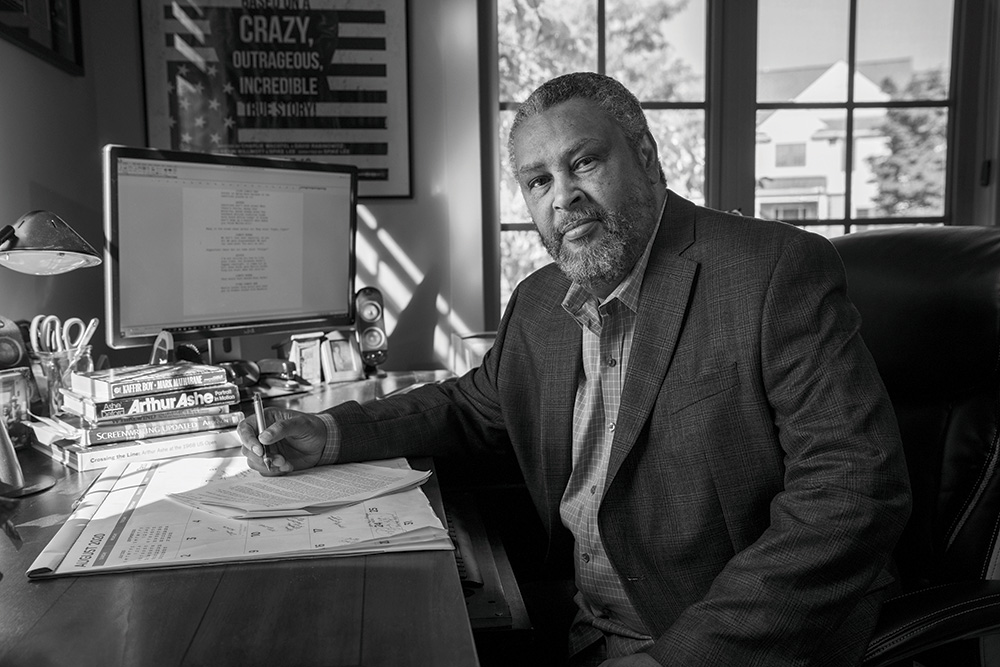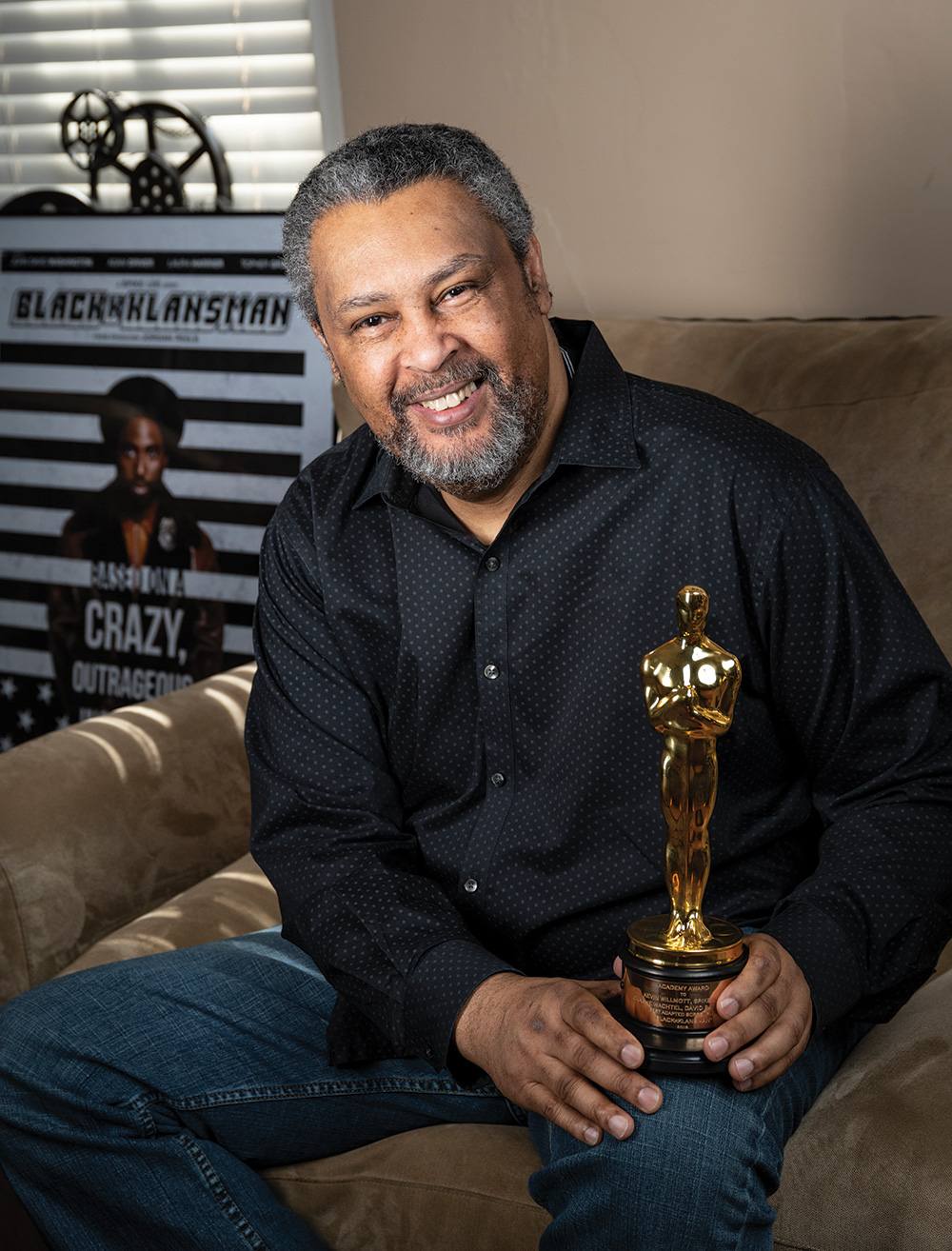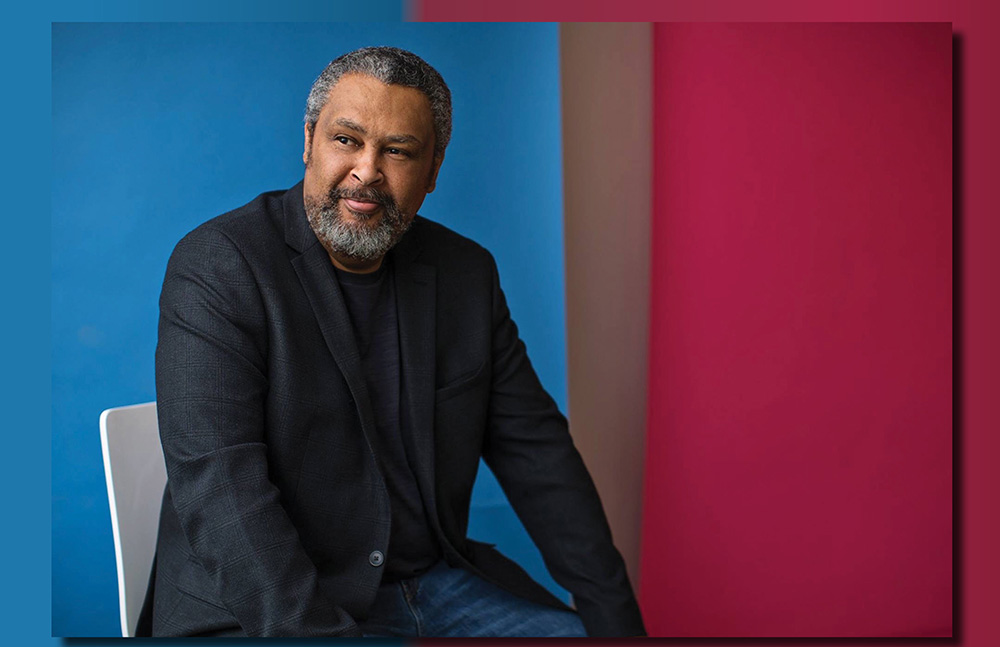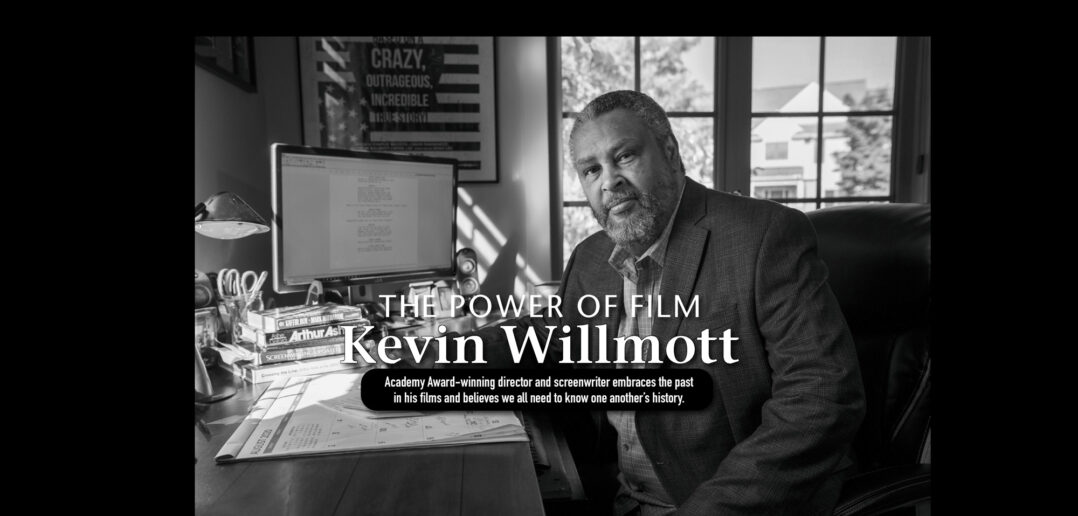| story by | |
| photos provided | by Kevin Willmott |
| OPEN A PDF OF THE ARTICLE |
Academy-Award-winning director and screenwriter embraces the past in his films and believes we all need to know one another’s history.

Kevin Willmott, The Power of Film, photo by Doug Barrett
Growing up in Junction City, Kansas, a town of around 20,000 people in the 1960s and ’70s, Academy Award-winning American film director and screenwriter, and professor of film at the University of Kansas (KU) Kevin Willmott quickly fell in love with movies. He has worked on film projects that focus on black issues, including “Ninth Street,” “C.S.A.: The Confederate States of America,” “Bunker Hill,” “Destination Planet Negro,” “Jayhawkers,” “The Only Good Indian,” “The 24th” and more. He has also collaborated with director Spike Lee on films “BlacKkKlansman” “Chi-Raq” and “Da 5 Bloods.”
Located 24 miles southwest of Manhattan, Junction City was a great town to be introduced to films, as it had three movie theaters and a drive-in. Kids could exchange eight Coke bottle tops for entrance to Summer “Coke Top” movies, perhaps because the town was the first city west of the Mississippi River to distribute Coca-Cola. Many times, the films were double features. Features like Jason and the Argonauts or Westerns may have been playing, and Willmott went to every chance he could almost every weekend. Sidney Poitier’s films were breaking barriers for African Americans being portrayed on the big screen but were exploitative of Blacks; this had a big impact on him. He didn’t see Disney or kid movies, only grown-up films like Westerns, war movies, James Bond or maybe a comedy. “It was a great time to grow up and fall in love with movies,” Willmott reminisces.
All of this has been on his mind lately, as the next film he is working on is “Brothers Gonna Work it Out,” an autobiography of sorts about growing up in Junction City. The film follows Willmott and his friend Bobby Taylor, as well as a female friend of theirs, in the adventures they had and going to the movies. The focus is on the blaxploitation movies, such as “Superfly,” “Shaft” and others, they would watch and how, at the same time, he dealt with exploitation in his life and of those around him. Inspired or influenced in part by the Italian film “Cinema Paradiso,” which in many ways parallels his experiences in Junction City, this film explores how he became a filmmaker.
At an early age, Willmott began writing stories or plays outside of class, which his sixth-grade teacher allowed him to read during class. The stories were really movies written out. He would act out the movies he saw in the backyard with his buddies. This, along with drawing images, being creative and imagining allowed him to express himself and find his artistic side.

Kevin Willmott with his “Oscar” for the screenplay BlacKkKlansman
LOCAL MATTERS
Our Local Advertisers – Making a Positive Impact
He attended Marymount College in Salina, Kansas, and credits professor Dennis Denning for having an impact on him and teaching him playwriting. Willmott wrote one of his first full plays, “Pearls,” at this time. This play was based on the Italian film “Swept Away,” by Lina Wertmüller, and he began writing plays based on movies. The next play he wrote, “Ninth Street,” helped get him into New York University (NYU) film school.
At NYU, Willmott was finally able study film and screenwriting. He notes that as a screenwriter and director, he realized he would have to make his own films if he wanted to tell his own stories. “No one is going to hire (you) without you making a movie,” Willmott explains, “your resume is your movie.” In the early ’90s, he came back to Kansas to make the play “Ninth Street” into a film. It took about a decade to produce the movie, and he says making the it was his real film school.
One of the best pieces of advice Willmott received from director Reginald Hudlin was to make another movie, which he did. “CSA: The Confederate States of America” got into the Sundance Film Festival, where he met director Spike Lee.
After NYU, Willmott got involved in activism and community organizing, which he sees as similar to producing. For both, you must develop a community around an idea that can create the story you are trying to tell. “If you have a good script, people will believe in your vision … It’s the glue that holds it all together,” he says. Independent film is all about the community working on a common goal, which is why he decided to stay in the Lawrence area: the community. The driving force behind this film community is to tell a story, and he encourages his students “to try and fill the niche that Hollywood doesn’t fill.”
As part of a local and national film and creative community Willmott has built, members help each other in various ways with keeping up with new trends in filmmaking, equipment, processes, special effects and more. KU professor Matt Jacobson has been Willmott’s cinematographer on most of his movies, and he understands the technical side of filmmaking. Mark von Schlemmer (a former student of Willmott’s) has been his editor for many years. A lot has changed in the last few years, which makes it hard to keep up sometimes. This another reason it is important to surround himself with a community of creatives. “You can’t do everything,” Willmott says. “My job is to write, direct and act when I need to.” His team includes a number of people in Los Angeles and its film industry, and others in the Lawrence/Kansas City area and beyond.
Filmmaker, KU professor and community member Laura Kirk believes, “Kevin’s leadership makes a set that is warm and open for creativity. While having industry experience and success, he always meets every single human where they are. He’s extremely loyal to this arts community. We want to do our best for him. There’s a lot of laughing, and there’s the gravity when we’re doing the heavy truth that needs to be told. Long days feel short working with Kevin.”
Willmott believes in the power of film. In the 1950s and ’60s, there were “problem films.” “ ‘Guess Who’s Coming To Dinner,’ ‘The Fine Ones,’ ‘”Gentleman’s Agreement.’ These movies defined American problems,” Willmott explains. “I would like to believe that movies make us better. … At a time when Republicans are trying to erase black history from education, it’s really important that we tell these stories. We all need to know each other’s history.” He says he has benefited so much from learning not only Black history but everyone’s, including Native Americans. Events like the Holocaust and other important history throughout time needs to be known. “Movies are a big part of this,” he says.

Kevin Willmott
Willmott believes stories through movies about history are foundational to America, “and it is how a multiracial democracy succeeds … and that is why limiting knowing each other’s histories is so antidemocratic.”
When Willmott started out as a filmmaker, he would show up to a meeting in Hollywood, and people would be surprised that he was Black. So few people of color could get into those meetings. He believes it is a great moment in time to be a Black filmmaker and recommends we not forget how hard it used to be. The ability to use the plethora of media available to filmmakers and writers. The ease of being able to research and look up something quickly online. As a screenwriter, Willmott doesn’t believe in “writer’s block” but thinks it is “not knowing what to do next …You need to leave—kind of—what you’re doing, put yourself in a place that will help you know what to do next,” he explains. Libraries are a great place to do this in a digital age.
Willmott says the film industry has changed; it’s not just filmed in Los Angeles or New York any longer. And film incentives are making a huge difference in where filmmakers decide to shoot their films. If there are no incentives, they will go elsewhere. Kansas has missed out on many film opportunities and the funds generated through producing the film here. Wilmott’s film The 24th was filmed in North Carolina, but he would have preferred to shoot it in Kansas using Kansas film crews, actors and workers, and supporting local businesses—keeping the funds in Kansas. He is currently collaborating with a number of people to get the State of Kansas to create tax initiatives and incentives for new film or TV projects, or production activity in Kansas. The economic impact could be substantial for the state, as many other states currently have these incentives in place. Grow Kansas Film is a not-for-profit group that is helping coordinate these efforts.
With all of his passion, talent and personality, Willmott will continue to tell stories, teach upcoming generations, collaborate with his community and encourage and inspire others to make this world a better place one movie at a time.




